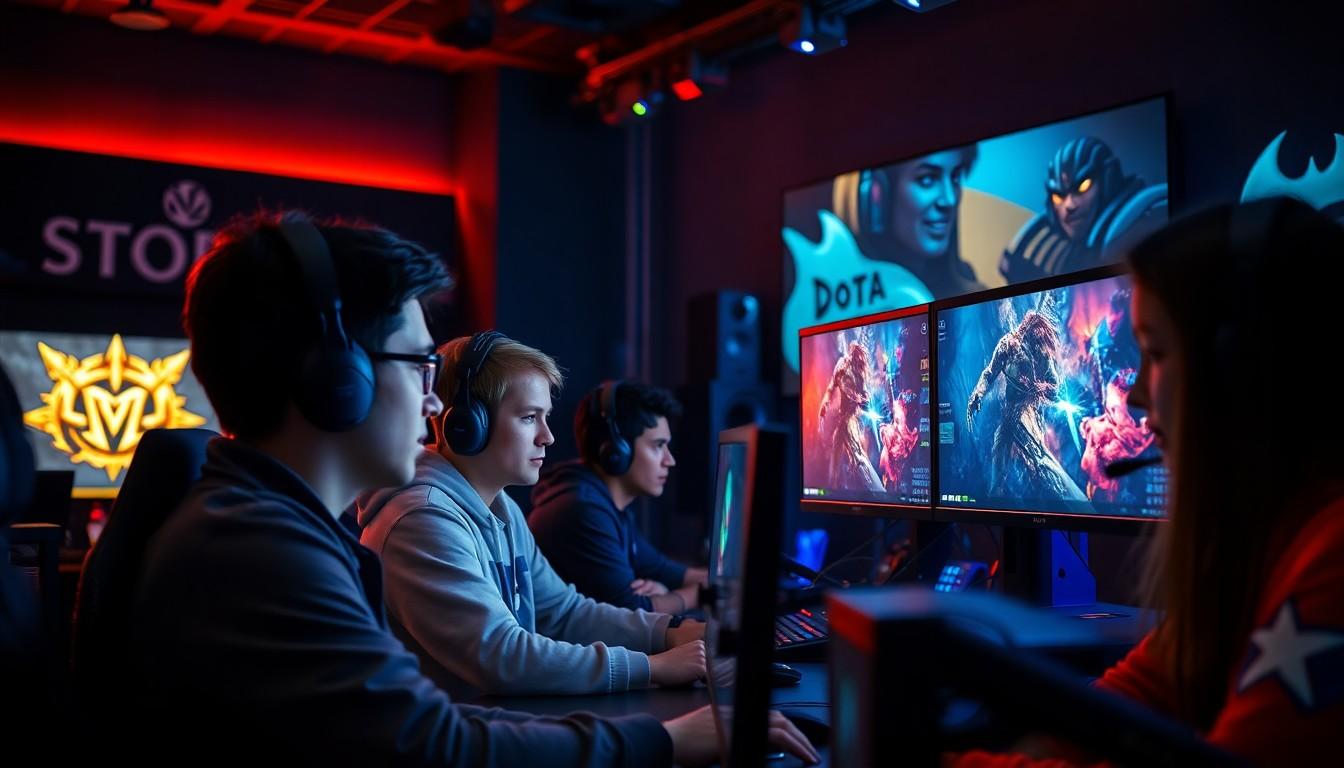In the fast-paced world of esports, strategy games reign supreme, blending cunning tactics with nail-biting competition. Imagine commanding an army of pixelated warriors while your heart races faster than a caffeinated squirrel. These games aren’t just about quick reflexes; they require sharp minds and strategic prowess, making them the chess matches of the digital age.
From outsmarting opponents to building empires, esports strategy games offer a thrilling playground for both seasoned gamers and newcomers alike. With every move, players dive deeper into a realm where wit is just as crucial as skill. So grab your headset and prepare to outthink your rivals—after all, in the world of esports, it’s not just about playing the game; it’s about mastering the art of strategy.
Esports Strategy Games
Esports strategy games combine tactical thinking with competitive excitement. Players rely on strategic intelligence and quick reflexes to outmaneuver their opponents. Titles like “StarCraft II” and “Dota 2” exemplify gameplay that demands both quick decision-making and detailed planning. Competitors often develop complex strategies to dominate their rivals while managing resources effectively.
Strategy games fall into various categories, including real-time strategy (RTS) and turn-based strategy (TBS). RTS games, such as “Age of Empires,” require players to make decisions in real-time, reacting swiftly to changing scenarios. In contrast, TBS games like “Civilization VI” allow players to research, build, and engage in combat at a more thoughtful pace, fostering deeper planning.
Many aspiring players start by studying successful strategies utilized by professional gamers. Notable esports events featuring strategy games attract millions of viewers, underscoring their popularity. Major tournaments showcase teams competing for substantial prize pools, reflecting the professional level of play. Global organizations and teams often sponsor skilled players, further solidifying the growth of the esports strategy genre.
Players frequently engage in community discussions and forums to share strategies and improve their skills. Networking within these communities enhances collaboration among gamers and fosters a learning environment. Ultimately, success in esports strategy games hinges on cultivating strategic skills and understanding your opponent’s tactics, making mastery essential for those seeking to excel in this thrilling domain.
Popular Esports Strategy Games
Esports strategy games captivate players with their unique blend of tactical depth and competitive gameplay. Various notable titles stand out in this exciting genre.
Game Titles
“StarCraft II,” a leading real-time strategy game, showcases players’ quick thinking and rapid decision-making abilities. “Dota 2,” a prominent multiplayer online battle arena game, emphasizes teamwork and intricate tactics. “Age of Empires,” another classic RTS, invites players to build empires and engage in battle. “Civilization VI,” a celebrated turn-based strategy game, allows for detailed planning over multiple turns. Contemporary titles like “Total War: Three Kingdoms” combine real-time and turn-based elements, adding new layers of strategy.
Competitive Scene
The competitive scene surrounding esports strategy games thrives on intense tournaments and dedicated player communities. Major events such as ESL One and The International draw millions of fans and offer substantial prize pools. Professional teams compete at the highest level, often recruiting players based on their exceptional strategic skills. Streaming and broadcasting play crucial roles in making these events accessible to global audiences. Communities frequently share strategies, dissect gameplay, and analyze matches, enhancing the overall competitive environment.
Key Features Of Esports Strategy Games
Esports strategy games showcase distinct characteristics that enhance the competitive experience. These features separate them from other game genres, emphasizing complexity and engagement.
Game Mechanics
Game mechanics define engagement and playability in esports strategy games. Mechanics include resource management, unit control, and territory expansion. Players often must gather resources to build armies and deploy units effectively. Fast-paced decision-making becomes critical during real-time encounters, while turn-based strategies emphasize careful planning and positioning. Each mechanic influences how players interact and strategize, shaping gameplay and altering outcomes. Titles like “StarCraft II” and “Civilization VI” exemplify unique mechanics, allowing players to experience diverse strategic landscapes.
Player Skills
Player skills represent crucial elements in succeeding at esports strategy games. Strategic thinking, quick reflexes, and adaptability are necessary for mastering complex game dynamics. Effectively reading opponents’ tactics empowers players to anticipate moves and counter strategies. Team coordination further enhances gameplay, requiring effective communication and collaboration. Success often hinges on analyzing gameplay patterns and leveraging knowledge from experienced gamers. Through practice and study, players refine their skills, aiming to gain an edge in competitive settings. Individual and team strategies contribute significantly to overall performance and enjoyment within the genre.
Tips For Success In Esports Strategy Games
Success in esports strategy games hinges on effective tactics and collaboration. Players must refine their strategic approach and work harmoniously with teammates to enhance gameplay.
Strategic Thinking
Mastering strategic thinking becomes essential for outsmarting opponents. Players analyze game dynamics, anticipate rival moves, and adjust tactics accordingly. Thorough understanding of game mechanics, such as resource management, empowers players to make informed decisions swiftly. Recognizing the strengths and weaknesses of specific units can turn the tide of battle. Additionally, studying professional gamers’ strategies provides valuable insights and techniques for improvement. Engaging in practice sessions helps refine skills and sharpen quick decision-making abilities. Success comes from leveraging these insights and continuously adapting to the evolving game landscape.
Team Coordination
Strong team coordination directly influences success in competitive matches. Players communicate effectively to share critical information during gameplay. Collaborative strategies require clear roles and responsibilities among team members. Understanding each teammate’s strengths fosters trust and enhances overall performance. Observing patterns in enemy strategies allows teams to devise countermeasures efficiently. Constant practice together cultivates chemistry needed for seamless execution of strategies. Attending team scrimmages or forming online practice groups boosts synergy significantly. Ultimately, cohesive teamwork elevates the gaming experience and leads to victories in high-stakes tournaments.
Future Trends In Esports Strategy Games
Esports strategy games continue to evolve, reflecting innovation and community engagement. New developments will shape their trajectory in the competitive landscape.
Emerging Titles
New games are consistently entering the esports strategy scene, offering fresh mechanics and innovative gameplay. Titles like “Company of Heroes 3” and “Warhammer 40,000: Dawn of War III” show how developers push boundaries. They introduce unique features that attract players and spectators alike. “Elysium” has gained attention for its focus on cooperative strategy elements, fostering teamwork and collaboration. Upcoming releases often build on established franchises while incorporating modern themes, ensuring relevance in a fast-paced market. Players eagerly anticipate these titles, fueling excitement and competitive spirit.
Technological Advancements
Technological progress significantly impacts esports strategy games, enhancing both gameplay and viewer experience. Advanced graphics engines provide stunning visuals that immerse players in their environments. Real-time data tracking systems allow for strategic insights during matches, benefiting teams and spectators. Cloud gaming platforms improve accessibility, allowing players to join tournaments from anywhere with an internet connection. Innovations in artificial intelligence create smarter non-player characters, adding depth to single-player campaigns. Enhanced communication tools enable effective coordination among team members during high-stakes matches. These advancements collectively redefine how players engage with strategy games and each other.
Esports strategy games represent a dynamic fusion of tactical prowess and competitive spirit. As players navigate complex game mechanics and engage in intense battles, they continually refine their skills and adapt to ever-evolving strategies. The genre’s growth is fueled by community collaboration and technological advancements, ensuring that both seasoned gamers and newcomers find excitement and challenge.
With major tournaments showcasing top-tier talent and innovative titles pushing the boundaries of gameplay, the future of strategy games in esports looks promising. As players immerse themselves in these intricate worlds, they not only enhance their own abilities but also contribute to a vibrant and thriving gaming community. The journey through this competitive landscape promises to be as rewarding as it is challenging.


